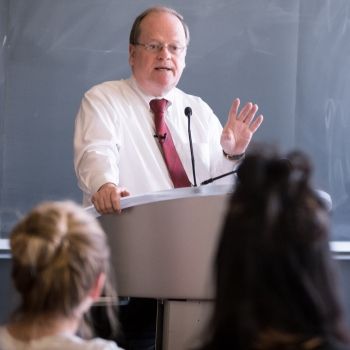
Focus on outcomes.
That was a key message presented by Justice Thomas Cromwell, Law’76, LLD’10 (Mus’73), in his talk to Queen’s Law students, faculty and staff on November 4.
Cromwell, Chair of the National Action Committee on Access to Justice in Civil and Family Matters, noted there are “mountains of reports on access to justice,” but seeing real change remains a challenge. “We see a very large ‘implementation gap’ between what exists and what ought to exist to provide meaningful access to justice,” he said. “We don’t pay enough attention to the bigger question: how do we actually make this happen on the ground?”
His talk focused on many of the barriers for successful implementation of access to justice, including a lack of tools to measure change, insufficient resources, and a legal culture that is not always conducive to change. He suggested these are big challenges, but persistent effort could bring about real change. “There’s a huge underserviced market out there. There are many people who need legal services, and many lawyers who need more business,” he said. “Why wouldn’t we do everything we can to bring these two groups together?”
Cromwell, recently retired from the Supreme Court of Canada, is now focusing his time on chairing the National Action Committee and bringing more attention to access to justice issues. “The Chief Justice (Beverley McLachlin) asked me to continue chairing the Committee after my retirement,” he said. “I’m grateful for the opportunity to have more time to continue devoting to this work.”
The talk wrapped up a four-day visit to his alma mater, where he guest-lectured in five classes, gave an interview for a Q&A feature in Queen’s Law Reports, and attended a reception for local lawyers and judges, as well as a roundtable with graduate students.
His schedule also included a visit to the Queen’s Law Clinics in downtown Kingston. “I believe strongly in clinical legal education, and I was a product of it,” he said, referencing his time in the early days of the Correctional Law Project (now Prison Law Clinic). “Queen’s clinics are contributing to access to justice in a concrete way,” he said, adding that other dimensions to access to information should be highlighted in law school courses and research.
Alice Colquhoun, Law’17, attended the talk and agrees the topic is a critical one for law students. “The issue of access to justice comes up in nearly every discussion about law and the legal profession,” she says. “It was important to hear Justice Cromwell’s insights on what needs to be done to address this issue.”
Cromwell’s talk helped attendees consider the importance of public support for change, and how individuals’ grievances and experiences with the justice system can be redefined as community problems. “We need to transform those individual instances into a collective call for systemic change,” he said. “It’s a challenge for all of us to consider how we can contribute to this movement.”
By Emily Lieffers
Watch a video of Justice Cromwell's lecture.